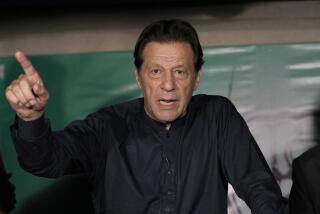Pakistan declares amnesty law unconstitutional
- Share via
Reporting from Islamabad, Pakistan — Pakistan’s Supreme Court on Wednesday struck down an amnesty that had shielded President Asif Ali Zardari from graft charges, a decision that could imperil the political future of a leader regarded by the U.S. as a key ally in the war on terrorism.
Though not unexpected, the ruling deals Pakistan’s 54-year-old president a serious blow at a time when his popularity with Pakistanis continues to sink and calls for his resignation mount.
The decision also is likely to draw concern in Washington, where Zardari is seen as a reliable partner in the fight against Islamic extremists. The Obama administration needs Zardari to help stem skepticism in Pakistan about the U.S. president’s new war strategy in Afghanistan, which sets a deadline of July 2011 for the start of a withdrawal of troops from Pakistan’s war-wracked neighbor.
Pakistanis worry that the U.S. will leave Afghanistan before that country has been stabilized, and believe that the 30,000 new troops Obama will send to Afghanistan will force Taliban fighters into Pakistan, whose own troops are struggling against militants in the country’s tribal areas.
The amnesty law was issued by former President Gen. Pervez Musharraf in 2007. Known as the National Reconciliation Ordinance, it was meant to allow Zardari’s wife, former Prime Minister Benazir Bhutto, to return from exile without facing the prospect of politically motivated corruption charges. When Bhutto was assassinated in December 2007, Zardari took over as her party’s chief and later was elected president by national and provincial lawmakers.
The issuance of the amnesty nullified several corruption cases Zardari had faced, including a charge that he misappropriated $1.5 billion. In all, at least 8,000 people benefited from the amnesty, including scores of government officials and bureaucrats.
In declaring the amnesty unconstitutional, the high court ordered the government to reopen the criminal cases of all who have benefited from the amnesty. That list includes Zardari, Interior Minister Rehman Malik and Defense Minister Ahmed Mukhtar.
The ruling specifically cited allegations of money laundering in Switzerland that involved Zardari and Bhutto. Once the amnesty was in force, Musharraf’s attorney general dropped the case in Swiss courts. As part of Wednesday’s ruling, the Pakistani government must reopen that case.
The ruling was announced to a packed courtroom by Chief Justice Iftikhar Mohammed Chaudhry, the popular jurist that Zardari initially balked at reinstating after Musharraf had ousted Chaudhry and other high court judges. Zardari reinstated the chief justice in March only after a grass-roots movement of lawyers began street protests in the cities of Lahore and Islamabad.
Moments after the ruling, jubilant lawyers gathered on the steps of the courthouse, chanting, “We will sacrifice everything for Chief Justice Chaudhry!”
“The impact of this judgment will be huge,” said Abdul Hafeez Pirzada, a lawyer for a petitioner challenging the amnesty. “Many people will have to go. Those who have already been convicted are finished.”
Just how vulnerable Zardari is to prosecution remains unclear. His spokesman, Farhatullah Babar, emphasized Wednesday that, as president, Zardari enjoys constitutional immunity from prosecution.
Zardari’s opponents, however, argue that he should never have been able to run for president because of a previous conviction. Pakistani law bars those with a conviction from running for president.
“Had the case not been terminated by the amnesty, the president wouldn’t have been elected as president,” said Ikram Chaudhry, another lawyer who argued against the amnesty.
Babar said that conviction didn’t apply because a higher court later overturned it.
“I don’t think there is any effect on the president,” said Babar, referring to the Supreme Court’s ruling. “Under the constitution, no proceedings can be initiated or continued on a sitting president or governor.”
Facing pressure from the country’s military, opposition parties and a segment of the Pakistani media, Zardari has already agreed to give up several key presidential powers.
He has relinquished authority over the country’s nuclear arsenal to Prime Minister Yusaf Raza Gilani. He also has said that later this month he plans to give up the power to dissolve parliament, dismiss the prime minister and appoint military chiefs.
More to Read
Sign up for Essential California
The most important California stories and recommendations in your inbox every morning.
You may occasionally receive promotional content from the Los Angeles Times.










